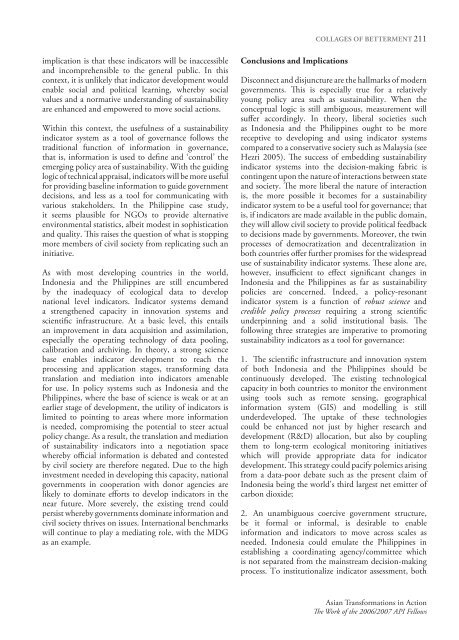Asian Transformations in Action - Api-fellowships.org
Asian Transformations in Action - Api-fellowships.org
Asian Transformations in Action - Api-fellowships.org
Create successful ePaper yourself
Turn your PDF publications into a flip-book with our unique Google optimized e-Paper software.
COLLAGES OF BETTERMENT 211implication is that these <strong>in</strong>dicators will be <strong>in</strong>accessibleand <strong>in</strong>comprehensible to the general public. In thiscontext, it is unlikely that <strong>in</strong>dicator development wouldenable social and political learn<strong>in</strong>g, whereby socialvalues and a normative understand<strong>in</strong>g of susta<strong>in</strong>abilityare enhanced and empowered to move social actions.With<strong>in</strong> this context, the usefulness of a susta<strong>in</strong>ability<strong>in</strong>dicator system as a tool of governance follows thetraditional function of <strong>in</strong>formation <strong>in</strong> governance,that is, <strong>in</strong>formation is used to def<strong>in</strong>e and ‘control’ theemerg<strong>in</strong>g policy area of susta<strong>in</strong>ability. With the guid<strong>in</strong>glogic of technical appraisal, <strong>in</strong>dicators will be more usefulfor provid<strong>in</strong>g basel<strong>in</strong>e <strong>in</strong>formation to guide governmentdecisions, and less as a tool for communicat<strong>in</strong>g withvarious stakeholders. In the Philipp<strong>in</strong>e case study,it seems plausible for NGOs to provide alternativeenvironmental statistics, albeit modest <strong>in</strong> sophisticationand quality. This raises the question of what is stopp<strong>in</strong>gmore members of civil society from replicat<strong>in</strong>g such an<strong>in</strong>itiative.As with most develop<strong>in</strong>g countries <strong>in</strong> the world,Indonesia and the Philipp<strong>in</strong>es are still encumberedby the <strong>in</strong>adequacy of ecological data to developnational level <strong>in</strong>dicators. Indicator systems demanda strengthened capacity <strong>in</strong> <strong>in</strong>novation systems andscientific <strong>in</strong>frastructure. At a basic level, this entailsan improvement <strong>in</strong> data acquisition and assimilation,especially the operat<strong>in</strong>g technology of data pool<strong>in</strong>g,calibration and archiv<strong>in</strong>g. In theory, a strong sciencebase enables <strong>in</strong>dicator development to reach theprocess<strong>in</strong>g and application stages, transform<strong>in</strong>g datatranslation and mediation <strong>in</strong>to <strong>in</strong>dicators amenablefor use. In policy systems such as Indonesia and thePhilipp<strong>in</strong>es, where the base of science is weak or at anearlier stage of development, the utility of <strong>in</strong>dicators islimited to po<strong>in</strong>t<strong>in</strong>g to areas where more <strong>in</strong>formationis needed, compromis<strong>in</strong>g the potential to steer actualpolicy change. As a result, the translation and mediationof susta<strong>in</strong>ability <strong>in</strong>dicators <strong>in</strong>to a negotiation spacewhereby official <strong>in</strong>formation is debated and contestedby civil society are therefore negated. Due to the high<strong>in</strong>vestment needed <strong>in</strong> develop<strong>in</strong>g this capacity, nationalgovernments <strong>in</strong> cooperation with donor agencies arelikely to dom<strong>in</strong>ate efforts to develop <strong>in</strong>dicators <strong>in</strong> thenear future. More severely, the exist<strong>in</strong>g trend couldpersist whereby governments dom<strong>in</strong>ate <strong>in</strong>formation andcivil society thrives on issues. International benchmarkswill cont<strong>in</strong>ue to play a mediat<strong>in</strong>g role, with the MDGas an example.Conclusions and ImplicationsDisconnect and disjuncture are the hallmarks of moderngovernments. This is especially true for a relativelyyoung policy area such as susta<strong>in</strong>ability. When theconceptual logic is still ambiguous, measurement willsuffer accord<strong>in</strong>gly. In theory, liberal societies suchas Indonesia and the Philipp<strong>in</strong>es ought to be morereceptive to develop<strong>in</strong>g and us<strong>in</strong>g <strong>in</strong>dicator systemscompared to a conservative society such as Malaysia (seeHezri 2005). The success of embedd<strong>in</strong>g susta<strong>in</strong>ability<strong>in</strong>dicator systems <strong>in</strong>to the decision-mak<strong>in</strong>g fabric iscont<strong>in</strong>gent upon the nature of <strong>in</strong>teractions between stateand society. The more liberal the nature of <strong>in</strong>teractionis, the more possible it becomes for a susta<strong>in</strong>ability<strong>in</strong>dicator system to be a useful tool for governance; thatis, if <strong>in</strong>dicators are made available <strong>in</strong> the public doma<strong>in</strong>,they will allow civil society to provide political feedbackto decisions made by governments. Moreover, the tw<strong>in</strong>processes of democratization and decentralization <strong>in</strong>both countries offer further promises for the widespreaduse of susta<strong>in</strong>ability <strong>in</strong>dicator systems. These alone are,however, <strong>in</strong>sufficient to effect significant changes <strong>in</strong>Indonesia and the Philipp<strong>in</strong>es as far as susta<strong>in</strong>abilitypolicies are concerned. Indeed, a policy-resonant<strong>in</strong>dicator system is a function of robust science andcredible policy processes requir<strong>in</strong>g a strong scientificunderp<strong>in</strong>n<strong>in</strong>g and a solid <strong>in</strong>stitutional basis. Thefollow<strong>in</strong>g three strategies are imperative to promot<strong>in</strong>gsusta<strong>in</strong>ability <strong>in</strong>dicators as a tool for governance:1. The scientific <strong>in</strong>frastructure and <strong>in</strong>novation systemof both Indonesia and the Philipp<strong>in</strong>es should becont<strong>in</strong>uously developed. The exist<strong>in</strong>g technologicalcapacity <strong>in</strong> both countries to monitor the environmentus<strong>in</strong>g tools such as remote sens<strong>in</strong>g, geographical<strong>in</strong>formation system (GIS) and modell<strong>in</strong>g is stillunderdeveloped. The uptake of these technologiescould be enhanced not just by higher research anddevelopment (R&D) allocation, but also by coupl<strong>in</strong>gthem to long-term ecological monitor<strong>in</strong>g <strong>in</strong>itiativeswhich will provide appropriate data for <strong>in</strong>dicatordevelopment. This strategy could pacify polemics aris<strong>in</strong>gfrom a data-poor debate such as the present claim ofIndonesia be<strong>in</strong>g the world’s third largest net emitter ofcarbon dioxide;2. An unambiguous coercive government structure,be it formal or <strong>in</strong>formal, is desirable to enable<strong>in</strong>formation and <strong>in</strong>dicators to move across scales asneeded. Indonesia could emulate the Philipp<strong>in</strong>es <strong>in</strong>establish<strong>in</strong>g a coord<strong>in</strong>at<strong>in</strong>g agency/committee whichis not separated from the ma<strong>in</strong>stream decision-mak<strong>in</strong>gprocess. To <strong>in</strong>stitutionalize <strong>in</strong>dicator assessment, both<strong>Asian</strong> <strong>Transformations</strong> <strong>in</strong> <strong>Action</strong>The Work of the 2006/2007 API Fellows
















